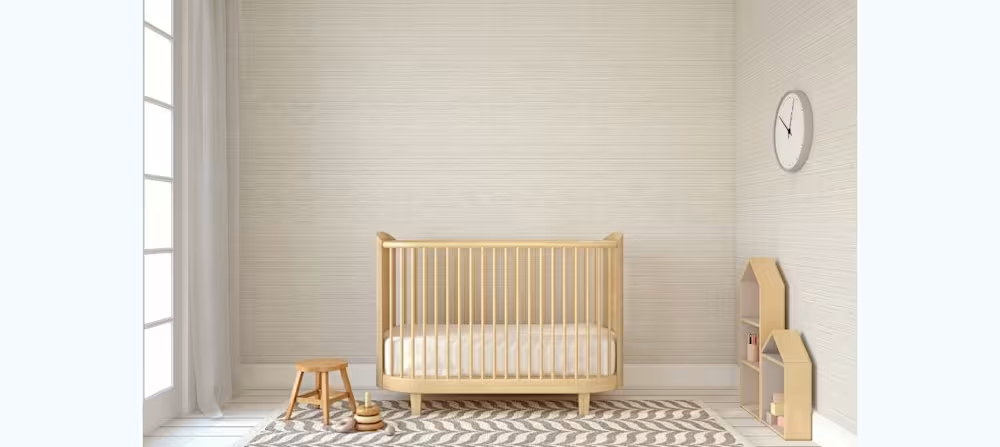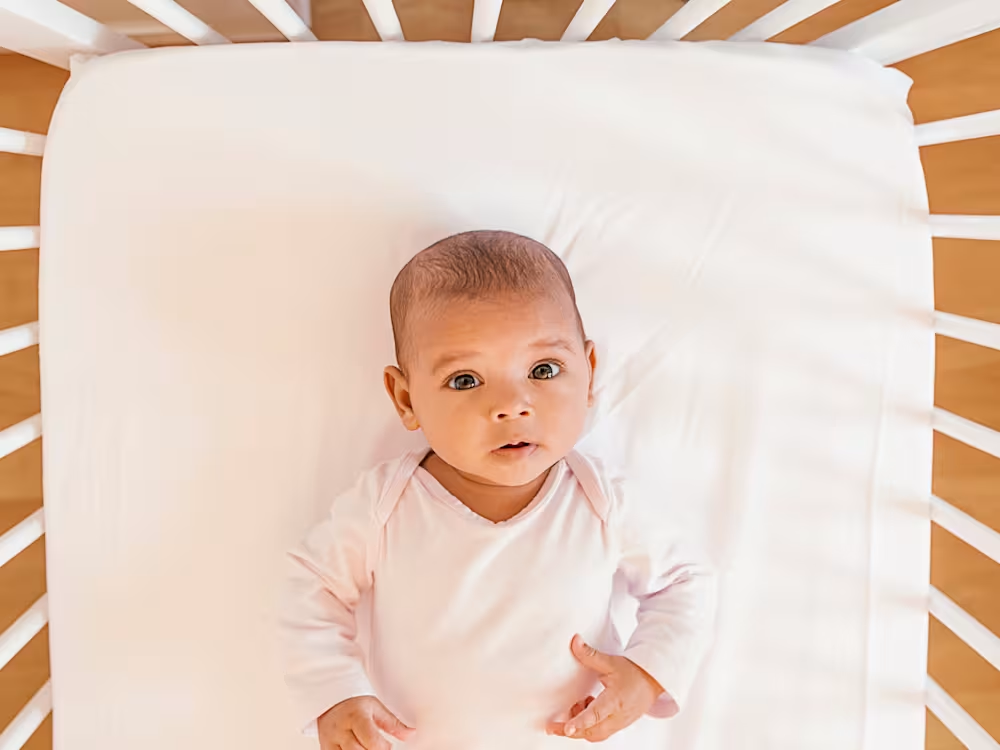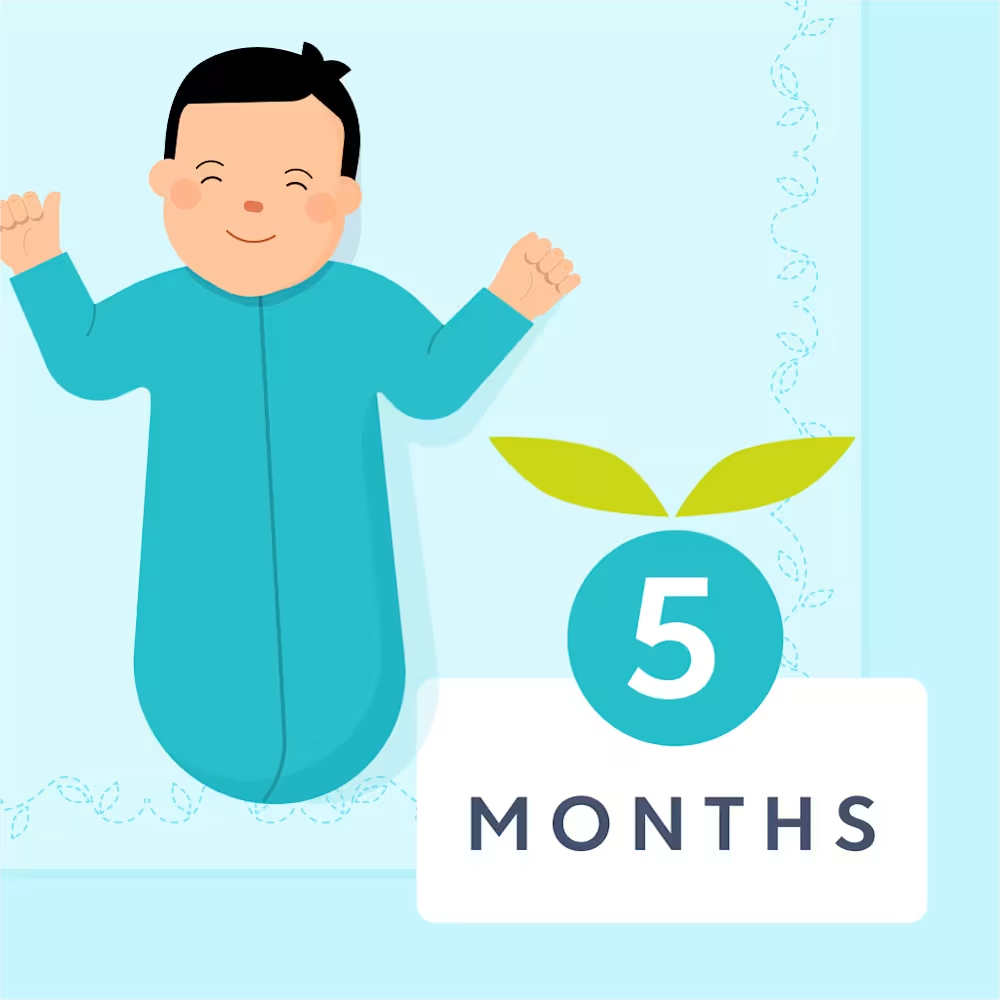Tips for room sharing with your baby
Updated Oct 16, 2025

Room sharing is popular for good reason: sharing a bedroom with your newborn is considered both safe and convenient. Alas, there are some downsides too. We’ll explore the pros and cons of room sharing with your baby, so you’ll be armed with all the information you need to decide whether it’s right for you.
What is room sharing?
Room sharing is simply the practice of sharing a bedroom with your child. It’s especially popular in the first year of life; the practice reduces sleep-related infant deaths and can make it easier to care for young infants.
When and how to room share with baby
When: The American Academy of Pediatrics (AAP) recommends room sharing (but not bed-sharing) right from birth [].
How: Becoming roommates is pretty straightforward. Place your baby’s sleep space (e.g., their bassinet, play yard, or crib) in the same room where you sleep at night. The AAP recommends placing your infant’s sleep space within arm’s reach of your own bed ] to reduce the risk of sudden infant death syndrome (SIDS) and suffocation.
Be sure to babyproof the space []. For safety reasons, you’ll want to make sure that no cords or strings dangle into your baby’s sleep space. You’ll also want to ensure that anything hanging over the crib, such as a mobile, is securely attached to the railing, wall, or ceiling.
Follow the same guidelines for keeping the sleep space safe: provide a flat sleep surface, place your baby on their back to sleep, and avoid putting soft blankets, pillows, and other objects in the baby’s bed.
If you think your baby might be getting too big for the crib, we have some tips for !
3 tips and tricks for room sharing
Here are tips for room sharing with your baby:
Muffle sounds
Pause before intervening
Get out of view
We'll explain more below:
Tip #1: Muffle sounds
Snoring, shifting in the bed, and coughing. All those little nighttime sounds from parents can wake the baby, and vice versa. Try using continuously throughout the night so that noises are less jarring and lead to fewer wake-ups for the whole family.
One caveat — hearing those small sounds from their baby may help parents respond [] more quickly to signs of distress. Speak with your doctor if you have questions about using a noise machine.
Tip #2: Pause before intervening
One minute you’re all sleeping, and the next minute you hear a cry. It’s quite common for infants to call out during brief nighttime wakings. While being close by can help parents quickly tend to their babies, many awakenings don’t actually need immediate parental intervention.
We encourage you to pause before jumping in, especially once your baby is no longer a newborn. How long should you pause? Try waiting a minute or two unless you feel your baby is in distress or needs to eat. Many babies will quickly fall back to sleep on their own if they’re not fully awakened by their mom or dad unnecessarily soothing them.
Tip #3: Get out of view
Frequent night waking may become a problem if you’re room sharing with an older baby or toddler. Consider moving the crib away from your bed and/or using a temporary room divider, so your baby doesn’t see you when they wake in the middle of the night.
You can check out our advice for if they don't seem to like it.
How long should you room share with your baby?
This question doesn’t have an easy answer. Most pediatric experts currently recommend room sharing during the first 6 months of life. Researchers are split, however, when it comes to room sharing after 6 months of age.
The leading pediatric healthcare experts at the AAP recently updated their safe sleep guidance []. They continue to recommend that parents room share with their baby for at least the first 6 months, preferably a year, because it is associated with lower rates of SIDS []. Other western countries, such as Canada, New Zealand, Australia, and the Netherlands, also recommend room sharing [] for at least the first 6 months.
A 2017 study [] noted, however, that recommendations to room share beyond 6 months weren’t evidence-based for the prevention of SIDS, “given that 90% of these tragedies occur before the age of 6 months.” The study found that room sharing at ages 4 and 9 months is associated with “less nighttime sleep, shorter sleep stretches, and unsafe sleep practices previously associated with sleep-related death.”
Benefits of room sharing with your baby
There are a lot of good reasons to share a bedroom with your baby:
Keeping your newborn nearby at night makes it easier to watch over them, and tend to their nighttime needs. Feeding, diaper changes, and snuggles are all more convenient when you share a room.
Room sharing is preventive against sleep-related infant deaths. The AAP “recommends room sharing because it can decrease the risk of SIDS by as much as 50%. []”
Breastfeeding, another protective factor against SIDS, is more easily facilitated and longer-lasting for room sharing families [].
A 2019 study [] found that room sharing during the first 6 months of life appears to be related to positive behavioral outcomes in middle childhood.
Sleep training and room sharing
Yes, you can * while room sharing! However, families who while sharing a bedroom may face additional challenges when it comes to reducing night wakings. Children may be able to hear, see, and even smell their parents in the same bedroom. This can turn a brief night waking into a full awakening when the child senses their caregiver and wants their help falling back to sleep.
Expect that progress may be slower if you sleep train while room sharing. Some room sharing parents will temporarily “camp out” in another room during sleep training, which can make it easier to improve night sleep.
*Before deciding if sleep training is a good fit for your family, you’ll want to consider whether your child is old enough to sleep train and is right for you. At Huckleberry, we’ve found that many babies aren’t able to consistently fall asleep on their own until 5 - 6 months of age.
Takeaway
Room sharing is the practice of sharing a room (not bed) with your child.
The AAP recommends placing your baby's sleep space within arm's reach of your own bed to reduce the risk of SIDS and suffocation. You'll also want to babyproof the space.
Tips for sharing a room with your little one include muffling sounds, pausing before intervening, and getting out of view while your little one is snoozing.
There are many benefits of sharing a bedroom with your baby. It makes it easier to watch over children and meed their nighttime needs (feedings, diaper changes, etc.), is preventative against sleep-related deaths, and one study found it related to positive behavioral outcomes in middle school.
Share article:
Note: The content on this site is for informational purposes only and should not replace medical advice from your doctor, pediatrician, or medical professional. If you have questions or concerns, you should contact a medical professional.
8 Sources
Share article:










